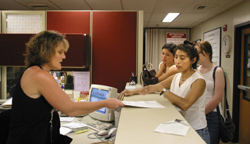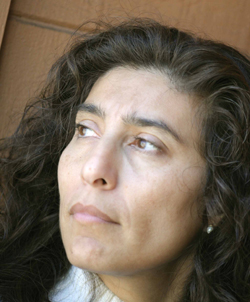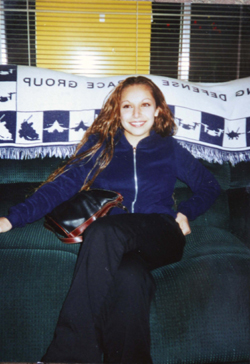Looking
back, looking forward
Elizabeth Scruggs reflects on life after her daughter’s death
and the Kenneth Freitas trial
BY DANIEL BLACKBURN
PHOTOS BY CHRISTOPHER GARDNER
|
‘SHE WAS MY CHILD’ Elizabeth Scruggs’ and her husband Tom’s campaign for justice culminated in the eventual conviction of Kenneth Freitas on a single count of misdemeanor vehicular manslaughter. |
When they got the fateful telephone call from the hospital that terrible evening in 2002, Tom and ElizabethScruggs feared the worst for their17-year-old daughter, Sarah.
Walking through a darkened Grover Beach crosswalk the night of Sept. 7, Sarah and a friend, Jennifer Tunae, also 17, had been struck by an SUV.
The Chevrolet Tahoe was driven by Kenneth Freitas, 33, the son of San Luis Obispo County's longtime tax collector and public administrator, Frank Freitas. Jennifer was only slightly injured. Sarah wasn't so fortunate.
Sarah's death after four days in the hospital stunned her parents. But what happened to the couple over the next few months as they waited for justice to grind into action was also excruciatingly painful.
Tom and Elizabeth Scruggs of Grover Beach grew increasingly impatient as the case languished in the district attorney's office.
And then Elizabeth Scruggs decided to swing into action. Her campaign for justice would have astonishing results, culminating in the eventual conviction of Kenneth Freitas on a single count of misdemeanor vehicular manslaughter.
Here, in her only interview to date, Elizabeth Scruggs tells about her successful but entirely unexpected confrontation with this county's good-ol'-boy network.
New Times: Now that Ken Freitas' trial is over, how are you and your husband feeling?
Elizabeth Scruggs: Mostly we were relieved that it was all over one way or the other. Of course I felt some gratification that it was a guilty verdict. But the bottom line is that it doesn't do anything for us - we are still missing our daughter. But just the fact that he had to go through due process, to be judged . that was really the crux of this whole thing.
New Times: Tell us about the night Sarah was hurt.
Elizabeth Scruggs: We received the phone call from the hospital, telling us that our daughter had been in an accident. Our hearts just sank. It was almost like we already knew how serious it was. Nothing like this had ever happened, we had never received such a phone call. We were so scared. We knew it was really bad when we got to the hospital and got a chance to see her. I think we pretty much knew . . The following four days it was just a matter of hoping against hope, that what eventually happened wouldn't happen. It was just the hardest time, and the worst was being at the hospital and having to let her go ... when the life support was removed.
New Times: When did you realize that the person driving the SUV was the son of a prominent SLO County politician?
Elizabeth Scruggs:We knew from the beginning when we heard his name that he had been the driver of the car, that that is who he was. Of course, Frank Freitas has been the tax collector forever, so we knew the name.
New Times: Did Frank Freitas' stature in the community worry you?
Elizabeth Scruggs: We felt it would influence the outcome of any proceedings. We felt certain about that. But we didn't ever think the case would be put on the back burner, that they would just attempt to sweep it under the rug.
New Times: When did you first realize that your daughter's case was getting deep-sixed?
Elizabeth Scruggs: The first month we were just chomping at the bit, waiting . waiting for something to happen. But then, a couple of months went by, and we were really getting anxious. By about Dec. 23 [2002], I decided to go to the district attorney's office directly. Tom and I were really angry. We had been put off. Our attorney was writing letters to the district attorney's office, and had called directly to [District Attorney's Filing Deputy] Lee Cogan. We just weren't getting anywhere. And at that point we realized that we were just being ignored, that they were just waiting for us to go away.
New Times: You didn't think Lee Cogan was doing anything?
Elizabeth Scruggs: I never had any direct contact with Cogan. I was never allowed to talk to him directly, and I was told that we were not allowed to make any contact with him. That apparently was part of their program. All I got were excuses from the secretary saying they were "still investigating."
New Times: Then what?
Elizabeth Scruggs: I wrote a letter on March 10 [2003] directly to Cogan asking why he hadn't responded, telling him what we wanted, but we heard nothing. A couple of days later I wrote directly to [San Luis Obispo County District Attorney] Gerald Shea, because I realized I wasn't going to get a response from Cogan. I expected not to. A few days after Shea got the letter, he contacted us through [Chief Deputy District Attorney] Steve Brown, to let us know that he had received our letter and he was looking into it. And he arranged a meeting in early April, when we met with Brown.
|
TAKING ACTION |
New Times: At that meeting, did you think Cogan was acting at the behest of superiors?
Elizabeth Scruggs: At that time I was convinced they didn't know anything about the case, and that Cogan had been acting on his own without any supervisors knowing anything about it. So I hoped they were trying to correct the situation.
New Times: Were you encouraged by this?
Elizabeth Scruggs: In one sense I was relieved that they were going to a higher-up to resolve this. But when that dragged on also, and then the attorney general decided not to prosecute, I decided at that point that the district attorney was just trying to get rid of the case and pass the buck so he wouldn't have to deal with it. I wish I'd realized that a lot earlier, but I was so relieved because I believed the matter was finally in some competent hands, and someone was actually going to do something. I eventually realized that Shea wasn't going to do anything, he just wanted to wash his hands of it and pass it off.
New Times: Shea passed the case on to the state attorney general, suggesting a possible conflict of interest, but the attorney general declined to prosecute. How did that make you feel?
Elizabeth Scruggs: My question to [Assistant Attorney General] Zee Rodriguez, with whom we were dealing, was, how can you not prosecute? Her answer was they didn't think they had enough evidence to successfully prosecute, that to prove negligence and the task of getting 12 jurors to agree was an impossibility. So they weren't going to even try. We were just devastated.
New Times: When did you decide to go to the county grand jury?
Elizabeth Scruggs: When we got the final letter from the attorney general - they had supposedly investigated further - I was ready to start writing to Shea again. But then my husband came across a grand jury report that had been released. He pointed out a complaint form on the back and suggested we send one to the grand jury.
New Times: Then what happened?
Elizabeth Scruggs: I called all of Sarah's friends and had them meet at our house. I told them that we had to get as many letters as possible into the grand jury and ask for an investigation into the district attorney's office. It was their responsibility to look into why this had happened. At this point, Ken Freitas had not been even ticketed, had not had to answer for anything. Nothing at all had happened. But we wanted answers and we wanted something done. Someone can get hit by a car and they die, and oh well? Like it never happened?
New Times: The petition and letter-writing effort was successful?
Elizabeth Scruggs: All of Sarah's friends came to our rescue. They went to Farmers' Market on three different occasions and sent letters and petitions. I was surprised, flabbergasted, by how many strangers responded. One of the things that really impressed me about this is that so many people . and I will never know their names, never meet them . but all had such an impact on our lives by simply signing a piece of paper, for what they felt should be addressed, to make things right. There are issues that people have the power to affect, and at least they can take some action, which is better than sitting and stewing and feeling helpless.
New Times: You got more than 700 letters and signatures out to the grand jury.
Elizabeth Scruggs: It was a tremendous outpouring. And of course I have to thank New Times for breaking the story and letting people know about it because a lot of people read New Times. Neither the Tribune nor any of the other newspapers in the county would touch it. So when the time came, an awful lot of people knew the story, and knew what they were signing, and what we were trying to accomplish. That played a tremendous part in the whole thing.
|
TOO YOUNG |
New Times: Well, you did contact us.
Elizabeth Scruggs: When I called New Times, I wasn't really sure if it was the right thing to be doing, because I knew it was going to reopen a lot of things I really didn't want to deal with. But it was a decision I had to make. This needed to be done.
New Times: When did you come to think Shea might file criminal charges?
Elizabeth Scruggs: We didn't know for sure for sure that he would, but we thought he was leaning toward filing, because of the meeting we had with him. Gerry Shea had to face a big bunch of citizens - he didn't have any answers then. We let him know the community was angered by him dragging his feet and turning the case over to the [attorney general]. Ultimately he was responsible for Lee Cogan. And since Cogan didn't do his job, then Shea had to step up and do something about it. Shea was very uncomfortable in that meeting because he had to face all of us, and look us in the eye. He knew we expected him to act.
New Times: What bothered you most during the trial?
Elizabeth Scruggs: Seeing how [defense attorney Ilan] Funke-Bilu was trying to blame everyone and everything for his client's actions. Blaming the district attorney. Suggesting that negligence on the part of Sarah and Jennifer was to blame. My heart sank. I felt like Funke-Bilu's last attempt was to smear the girls and make them look responsible.
New Times: Then what?
Elizabeth Scruggs: Then I started to feel angry, because in the end Jennifer and Sarah don't need defending. They were the victims. Ken Freitas was the one responsible. Despicable. That really angered me. Then I knew that I had done the right thing. I said to myself, bring it on, Funke-Bilu. Your client is guilty and I think the jury is going to see that.
New Times: Your feelings toward Ken Freitas during the trial?
Elizabeth Scruggs: Even if he was found not guilty, he at least had to go through the process, get an attorney, all the inconvenience, just a small portion of what we have had to go through. It was worth it. I thought the tactics used to try to get him off were very unethical. Funke-Bilu was willing to do anything to win. The jury didn't appreciate it, I think.
New Times: Freitas' family was there throughout the trial, Any thoughts about them?
Elizabeth Scruggs: I have some empathy for Mrs. Freitas. I told her one day that I was really sorry for both of us, because as a mother I can understand. But that's as far as it goes. She's the only one in that family I talked to.
New Times: Now that it's over, what are your thoughts?
Elizabeth Scruggs: I would rather go through this all again a hundred times if it meant that I would have Sarah again for the 17 years that we had with her. She was my child and she was special, generous, sweet, lovely, and we really miss her. This has been a devastating experience for us, but when you look around the world and see that this is an everyday experience for so many other people . you just know that man's justice is so imperfect. But I'm convinced there is a higher power, because of this imperfection. I have to think there's a better place for Sarah. That will help me get through my life ahead. ³
News Editor Daniel Blackburn can be reached at [email protected].


